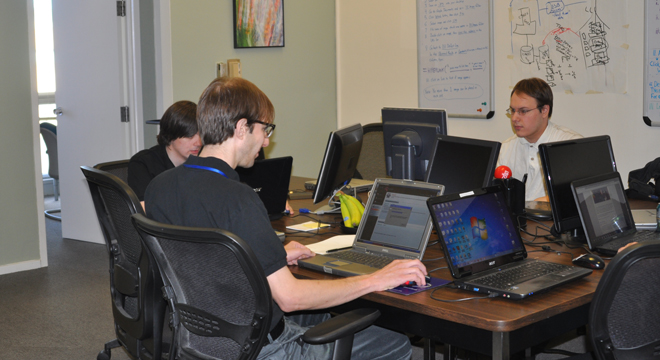Highland Park, Il.-based nonprofit software testing company Aspiritech is pioneering a new business model in the United States that champions the unique concentration and detail-oriented strengths of its 15 employees, all of whom have been diagnosed with disorders on the autism spectrum.
The company – which was launched in 2010 by Moshe and Brenda Weitzberg after their son Oran, 32, who has Asperger’s, was fired from his grocery job – is on track to pull in $120,00 in revenue for 2011, according to an article from the Associated Press, though 60 percent of that is from donations.
It offers a range of services including compatibility testing, functional testing and test script development and has already chalked up nine satisfied clients, including ISI Telemanagement Solutions, which itself has services distributed by industry leaders Cisco, Avaya, Nortel, IBM, EDS, AT&T.
Founder Moshe Weitzeberg even revealed to Idea Lab in a phone call that Aspiritech is in high-level negotiations to provide services for two of the largest companies in the world and could even secure a deal within the month, though he declined to mention specific names.
At the same time, the company is more sensitive to the specific individual needs and habits of its employees, most of whom are in their 20s and 30s: Nobody is reprimanded for showing up late or taking breaks to be by themselves. And Aspiritech hosts social gatherings to help improve social skills and just to have fun.
But for all of Aspiritech’s early success, Weitzberg admits that the going has been tough and that it has been particularly difficult to get the wider business community in the U.S. to take Aspiritech seriously.
“The biggest challenge is to convince the business community that we can do this kind of job as good and even better than the typical [software testing] companies,” Weitzberg said, explaining that there is a certain stigma around non-profits that Aspiritech is striving to overcome, namely that they are “dysfunctional or not a real business.”
“Our work is not a charity,” he added. “Our strategy is to provide a quality product. It is very important for us that every company works with us is happy.”
Abroad, software companies that boast autistic workforces enjoy greater popularity and prestige, particularly in Belgium, Japan and Israel, according to the Associated Press. Danish software testing firm Specialisterne, which has provided services for Oracle and Microsoft, was, in fact, the inspiration for Aspiritech.
And with the number of diagnoses on the autism spectrum rising around the globe and in the United States, especially in children, it will be soon become a matter of necessity for employers to take companies such as Aspiritech more seriously.
Aspiritech isn’t concerned about reinforcing any negative stereotype that computer geeks are by nature more antisocial, either.
“I know people on the autism spectrum who aren’t interested in computers,” said Aspiritech autism specialist Marc Lazar in a phone call with Idea Lab, “But from my experience a vast majority of people on the spectrum are interested in computers and computer service, so it is generally a good fit. Some of us are proud to be geeky. But we aren’t limiting people to just software testing.”
Indeed, Lazar and Weitzberg pointed out that the company’s social media strategy (it can be found on Twitter, Facebook and YouTube) is run entirely by one employee, Katie.
“I’m not a young man,” Weitzberg told Idea Lab, “Social media isn’t my cup of tea. But it has given us business, I note the importance, and I’m glad one of our employees is so capable with it.”









